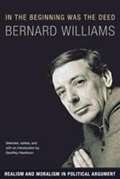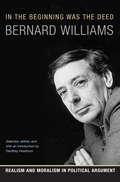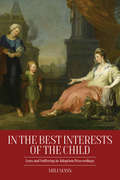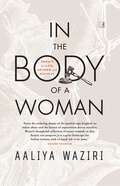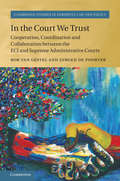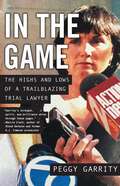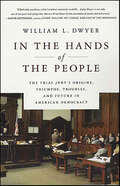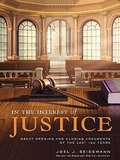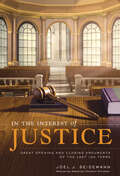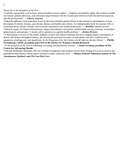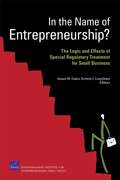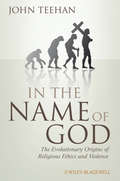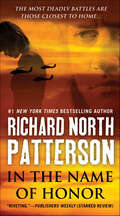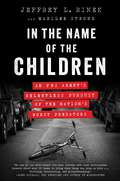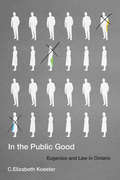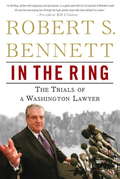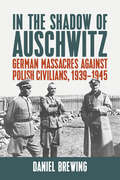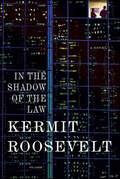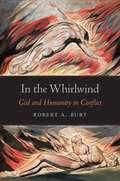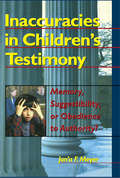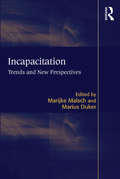- Table View
- List View
In the Beginning Was the Deed: Realism and Moralism in Political Argument
by Bernard WilliamsBernard Williams is remembered as one of the most brilliant and original philosophers of the past fifty years. Widely respected as a moral philosopher, Williams began to write about politics in a sustained way in the early 1980s. There followed a stream of articles, lectures, and other major contributions to issues of public concern--all complemented by his many works on ethics, which have important implications for political theory. This new collection of essays, most of them previously unpublished, addresses many of the core subjects of political philosophy: justice, liberty, and equality; the nature and meaning of liberalism; toleration; power and the fear of power; democracy; and the nature of political philosophy itself. A central theme throughout is that political philosophers need to engage more directly with the realities of political life, not simply with the theories of other philosophers. Williams makes this argument in part through a searching examination of where political thinking should originate, to whom it might be addressed, and what it should deliver. Williams had intended to weave these essays into a connected narrative on political philosophy with reflections on his own experience of postwar politics. Sadly he did not live to complete it, but this book brings together many of its components. Geoffrey Hawthorn has arranged the material to resemble as closely as possible Williams's original design and vision. He has provided both an introduction to Williams's political philosophy and a bibliography of his formal and informal writings on politics. Those who know the work of Bernard Williams will find here the familiar hallmarks of his writing--originality, clarity, erudition, and wit. Those who are unfamiliar with, or unconvinced by, a philosophical approach to politics, will find this an engaging introduction. Both will encounter a thoroughly original voice in modern political theory and a searching approach to the shape and direction of liberal political thought in the past thirty-five years.
In the Beginning Was the Deed: Realism and Moralism in Political Argument
by Bernard WilliamsBernard Williams is remembered as one of the most brilliant and original philosophers of the past fifty years. Widely respected as a moral philosopher, Williams began to write about politics in a sustained way in the early 1980s. There followed a stream of articles, lectures, and other major contributions to issues of public concern--all complemented by his many works on ethics, which have important implications for political theory. This new collection of essays, most of them previously unpublished, addresses many of the core subjects of political philosophy: justice, liberty, and equality; the nature and meaning of liberalism; toleration; power and the fear of power; democracy; and the nature of political philosophy itself. A central theme throughout is that political philosophers need to engage more directly with the realities of political life, not simply with the theories of other philosophers. Williams makes this argument in part through a searching examination of where political thinking should originate, to whom it might be addressed, and what it should deliver. Williams had intended to weave these essays into a connected narrative on political philosophy with reflections on his own experience of postwar politics. Sadly he did not live to complete it, but this book brings together many of its components. Geoffrey Hawthorn has arranged the material to resemble as closely as possible Williams's original design and vision. He has provided both an introduction to Williams's political philosophy and a bibliography of his formal and informal writings on politics. Those who know the work of Bernard Williams will find here the familiar hallmarks of his writing--originality, clarity, erudition, and wit. Those who are unfamiliar with, or unconvinced by, a philosophical approach to politics, will find this an engaging introduction. Both will encounter a thoroughly original voice in modern political theory and a searching approach to the shape and direction of liberal political thought in the past thirty-five years.
In the Best Interests of the Child: Loss and Suffering in Adoption Proceedings
by Mili MassMarshalling her experience as an expert witness in court proceedings on non-consensual, confidential adoption in Israel, Mass describes legal proceedings following the Israeli state petition that declares children eligible for adoption because of alleged parental incapability, and explores the politics of state intervention in the parent/child relationship. The selected case studies present the testimonies of the children, the parents, the designated adoptive parents, and the state’s representatives, as well as the author’s own testimony.
In the Body of a Woman: Essays on Law, Gender and Society
by Aaliya Waziri&‘From the enduring shame of the marital-rape loophole to online abuse and the horror of superstition-driven murders, Waziri&’s thoughtful collection of essays reminds us that despite our progress, it is a grim landscape for Indian women, with so much left to be done.&’ SHASHI THAROOR &‘The author brilliantly lays bare for the reader the emergent, new societal responses towards sexual attitudes and gender justice and competently captures with nuance and sensitivity the attempts of the legal system to keep pace without being overwhelmed.&’ SALMAN KHURSHID &‘An incisive and mindful analysis of gender and parity through the intersection of legal frameworks and societal perspectives. Aaliya Waziri draws upon a vast canvas to present an articulate and thoughtful case for gender-responsive lawmaking.&’ NAMITA GOKHALE From important contemporary issues like the changing landscape of marital rape laws to the inadequacy of the current cyberbullying laws, from historical milestones such as the women who helped draft the Indian constitution after Independence to examining religious laws and international obligations, Aaliya Waziri writes a deeply researched, informative and powerful book. Her attempt is to address the many questions that a lay person or even a lawyer might have about what lies at the intersection of law, gender and society.In the Body of a Woman, with its focus on gender justice, pivots on the idea that feminism is contextual. There may not be any straightjacket formula to fix all the woes of women but we can start by strengthening our institutional responses and not treat half the country&’s population as second class citizens. Occasionally acerbic yet deeply compassionate, hopeful yet sometimes despairing, Waziri doesn&’t pull her punches in these essays where she looks clinically at the judicial system but in her own unique, empathetic way that makes this book an engaging read for—it must be stressed—men and women who are interested in probing the intersection of law and gender.
In the Common Defense
by James E. BakerThe threat of terrorism places U. S. national security police at the crossroads of security and liberty. This book focuses on the legal issues surrounding the war on terror. This book is essential reading for anyone who wants an honest review of the law and an accessible understanding of how law relates to U. S. national security. This is also a book about national security government and why it is dependent on good process and the moral integrity of those who wield its power. This is at heart a book about the process and practice of government and what we should mean when we refer to "good government. "
In the Court We Trust: Cooperation, Coordination and Collaboration between the ECJ and Supreme Administrative Courts (Cambridge Studies in European Law and Policy)
by Jurgen de Poorter Rob van GestelThe preliminary reference procedure has long been envisaged as a judicial dialogue between the European Court of Justice and national courts. However, in reality the relationship appears to be closer to one of growing separation rather than to a happy marriage between equal partners. This book tries to find out: what is behind this? A study of the existing literature, combined with a case law analysis and interviews with judges, has shown that there are a number of important stumble blocks hindering the communication between these courts, such as language barriers, time constraints, and a failing digital infrastructure. However, on a deeper level there also appears to be a lack of mutual trust that prevents Supreme Administrative Courts from using the possibilities the procedure provides, such as the opportunity to offer provisional answers to the Court of Justice and the use of requests for clarification by the latter.
In the Game: The Highs and Lows of a Trailblazing Trial Lawyer
by Peggy GarrityPeggy Garrity began her life as a small-town Irish Catholic girl in the Midwest. Initially convent-bound, she became determined to escape a life like her mother&’s, and in the mid-1970s she reinvented herself as a high-profile Los Angeles trial lawyer and single mother of four. At a time when there were virtually no women solo practitioners, she represented David against Goliath—and risked it all in the process. Including compelling courtroom dramas featuring would-be presidential assassin Sara Jane Moore, celebrities Clint Eastwood, Sondra Locke, and Cheryl Tiegs, and some of Los Angeles&’s most notorious murder cases, In the Game is the groundbreaking story of a thrill-seeking solo trial lawyer—and single mother—who beat the odds at a time when working mothers, especially those in male-dominated professions like the law, faced the gauntlet of discrimination.
In the Gravest Extreme: The Role of the Firearm in Personal Protection
by Massad F. AyoobThe book is written to a broad general audience, not specifically to police officers. However, the information that Ayoob provides is equally useful to the armed citizen and the sworn law enforcement officer.
In the Hands of the People: The Trial Jury's Origins, Triumphs, Troubles, and Future in American Democracy
by William L. DwyerIn a passionate warning that is not only well-reasoned, as becomes a renowned former trial lawyer and present federal judge, but is also a compelling and entertaining read, William L. Dwyer defies those who would abolish our jury system and hand over its power to judges or to panels of "experts." He aims, by making his readers aware of what should be done, to help us save what he calls "America's most democratic institution."In an overview of litigation's universe, Dwyer goes back several centuries to describe the often terrifying ways our ancestors arrived at verdicts of guilt or innocence. Tracing the evolution of our present-day system, he gives us excerpts from the actual records of such trials as that of young William Penn, arrested for preaching Quaker beliefs in public; the Salem witch trials; and the landmark civil rights trial of 18th century newspaper publisher John Peter Zenger, whose attorney was the original "Philadelphia lawyer." Along with these famous courtroom episodes are many never before described in print, all of them infused with the drama that gives life to the law.Dwyer's language is clear and engaging - a pleasant surprise for readers apprehensive about legal gobbledygook. He has a store of courtroom "war stories," some inspiring, some alarming, many enlivened by gleams of the author's wry humor.Underlying that humor, however, is the judge's fear that the jury system is endangered by neglect and misunderstanding, and could be lost without the public being aware of what is happening. The book shows that despite much adverse publicity, the American jury still works capably, at times brilliantly, when given a fair chance by the legal professionals who run trials. Consequently, the author deals with what has gone wrong with American litigation, the controversy over the jury's competence and integrity, and trial and pretrial reforms that must be made to save trial by jury and reshape American litigation in the twenty-first century.
In the Interest of Justice
by Joel J. SeidemannDrawing from some of the most well-known courtroom cases of our time, this rich and rewarding volume collects more than two dozen of the most memorable opening and closing arguments made by top prosecutors and defense attorneys in the last 100 years.
In the Interest of Justice: Great Opening and Closing Arguments of the Last 100 Years
by Joel J. SeidemannThis rich and rewarding volume collects more than two dozen of the most memorable opening and closing arguments made by top prosecutors and defense attorneys of the last one hundred years. Carefully selected to explore every major aspect and challenge of the legal process, these speeches highlight the tactics and strategies, colorful language, and stirring rhetoric that lawyers use to win judge and jury to their side. With a shrewd eye for courtroom stratagems and a keen understanding of the social currents that shape them, Manhattan assistant district attorney Joel Seidemann introduces and illuminates each speech from an insider's perspective. Arguments from landmark trials are included to reveal the smartest tricks of the trial lawyer's trade and demonstrate the power of an impassioned presentation to tip the scales toward the fulfillment of justice.
In the Kingdom of the Sick: A Social History of Chronic Illness in America
by Laurie EdwardsThirty years ago, Susan Sontag wrote, "Everyone who is born holds dual citizenship in the kingdom of the well and the kingdom of the sick ... Sooner or later each of us is obliged, at least for a spell, to identify ourselves as citizens of that other place." Now more than 133 million Americans live with chronic illness, accounting for nearly three-quarters of all health care dollars, and untold pain and disability. <p><p> There has been an alarming rise in illnesses that defy diagnosis through clinical tests or have no known cure. Millions of people, especially women, with illnesses such as irritable bowel syndrome, chronic pain, and chronic fatigue syndrome face skepticism from physicians and the public alike. And people with diseases as varied as cardiovascular disease, HIV, certain cancers, and type 2 diabetes have been accused of causing their preventable illnesses through their lifestyle choices. <p><p> We must balance our faith in medical technology with awareness of the limits of science, and confront our throwback beliefs that people who are sick have weaker character than those who are well. Through research and patient narratives, health writer Laurie Edwards explores patient rights, the role of social media in medical advocacy, the origins of our attitudes about chronic illness, and much more. What The Noonday Demon did for people suffering from depression, In the Kingdom of the Sick does for those who are chronically ill.
In the Name of Entrepreneurship?
by Susan M. Gates Kristin J. LeuschnerWhat are the differential effects of regulation and policy on small businesses? What is the impact of special regulatory treatment for small businesses? This book sheds light on these issues through analysis of the regulatory and public policy environment with regard to small businesses, including focused studies in four key areas: health insurance, workplace safety, corporate governance, and business organization.
In the Name of God: The Evolutionary Origins of Religious Ethics and Violence (Blackwell Public Philosophy Series #34)
by John TeehanReligion is one of the most powerful forces running through human history, and although often presented as a force for good, its impact is frequently violent and divisive. This provocative work brings together cutting-edge research from both evolutionary and cognitive psychology to help readers understand the psychological structure of religious morality and the origins of religious violence. Introduces a fundamentally new approach to the analysis of religion in a style accessible to the general reader Applies insights from evolutionary and cognitive psychology to both Judaism and Christianity, and their texts, to help understand the origins of religious violence Argues that religious violence is grounded in the moral psychology of religion Illustrates its controversial argument with reference to the 9/11 terrorist attacks, and the response to the attacks from both the terrorists and the President. Suggests strategies for beginning to counter the divisive aspects of religion Discusses the role of religion and religious criticism in the contemporary world. Argues for a position sceptical of the moral authority of religion, while also critiquing the excesses of the “new atheists” for failing to appreciate the moral contributions of religion Awarded Honourable Mention, 2010 Prose Awards
In the Name of Honor: A Thriller
by Richard North Patterson“An absolute humdinger of a murder mystery . . . unrelenting suspense [and] a close look at the dysfunctions of military justice and of one particular family.” —Scott Turow, #1 New York Times–bestselling author of Presumed InnocentA “riveting legal thriller” by the #1 New York Times–bestselling author of Trial (Publishers Weekly, starred review)The McCarrans and the Gallaghers have been close for decades, ever since Anthony McCarran—now one of the army’s most distinguished generals—met Jack Gallagher, a fellow West Pointer later killed in Vietnam. Now a new generation faces combat, and Lt. Brian McCarran, the general’s son, has returned from a harrowing tour in Iraq.Traumatized by experiences he will not reveal, Brian depends on his lifelong friendship with Kate Gallagher, who’s married to Brian’s commanding officer, Capt. Joe D’Abruzzo. But D’Abruzzo also seems changed by the experiences he and Brian shared in Iraq, growing secretive and remote.Tragedy strikes when Brian shoots and kills D’Abruzzo on their Virginia army post. He pleads self-defense. Kate backs him up, saying her husband had turned violent and abusive. But Brian and Kate have their own secrets, and now Capt. Paul Terry, an accomplished young JAG lawyer, must defend Brian in a high-profile court-martial. Before the case is over, Terry will become deeply entwined with the McCarrans—and learn that families, like war, can break the sturdiest of souls.“Powerful . . . Patterson long ago established himself as one of the nation’s best writers of serious thrillers, and his latest novel burnishes his reputation.” —Richmond Times-Dispatch“Readers will find themselves engrossed as well as pleased by a twist revealing that there’s more to this powerful yet seemingly straightforward story than first meets the eye.” —Booklist“Patterson’s insights into PTSD are fascinating but never interrupt the story’s flow to its explosive ending, and his courtroom drama is as intensely engaging as the most action-filled thrillers.” —Library Journal (starred review)
In the Name of the Children: An FBI Agent's Relentless Pursuit of the Nation's Worst Predators
by Marilee Strong Jeffrey L. Rinek"The voice that narrates In the Name of the Children: An F.B.I. Agent's Relentless Pursuit of the Nation's Worst Predators, which Rinek wrote with the journalist Marilee Strong, sounds warm and humane, qualities missing from much crime writing. Their book is a professional job, filled with illuminating details about the day-to-day operations of the bureau." —New York Times Book Review FBI Special Agent Jeff Rinek had a gift for getting child predators to confess. All he had to do was share a piece of his soul . . . In the Name of the Children gives an unflinching look at what it's like to fight a never-ending battle against an enemy far more insidious than terrorists: the predators, lurking amongst us, who seek to harm our children. During his 30-year career with the FBI, Jeff Rinek worked hundreds of investigations involving crimes against children: from stranger abduction to serial homicide to ritualized sexual abuse. Those who do this kind of work are required to plumb the depths of human depravity, to see things no one should ever have to see—and once seen can never forget. There is no more important—or more brutal—job in law enforcement, and few have been more successful than Rinek at solving these sort of cases. Most famously, Rinek got Cary Stayner to confess to all four of the killings known as the Yosemite Park Murders, an accomplishment made more extraordinary by the fact that the FBI nearly pinned the crimes on the wrong suspects. Rinek's recounting of the confession and what he learned about Stayner provides perhaps the most revelatory look ever inside the psyche of a serial killer and a privileged glimpse into the art of interrogation. In the Name of the Children takes readers into the trenches of real-time investigations where every second counts and any wrong decision or overlooked fact can have tragic repercussions. Rinek offers an insider's perspective of the actual case agents and street detectives who are the boots on the ground in this war at home. By placing us inside the heart and mind of a rigorously honest and remarkably self-reflective investigator, we will see with our own eyes what it takes—and what it costs—to try to keep our children safe and to bring to justice those who prey on society's most vulnerable victims. With each chapter dedicated to a real case he worked, In the Name of the Children also explores the evolution of Rinek as a Special Agent—whose unorthodox, empathy-based approach to interviewing suspects made him extraordinarily successful in obtaining confessions—and the toll it took to have such intimate contact with child molesters and murderers. Beyond exploring the devastating impact of these unthinkable crimes on the victims and their families, this book offers an unprecedented look at how investigators and their loved ones cope while living in the specter of so much suffering.
In the Public Good: Eugenics and Law in Ontario (McGill-Queen's/Associated Medical Services Studies in the History of Medicine, Health, and Society #57)
by C. Elizabeth KoesterIn the early twentieth century, the eugenics movement won many supporters with its promise that social ills such as venereal disease, alcoholism, and so-called feeble-mindedness, along with many other conditions, could be eliminated by selective human breeding and other measures. The provinces of Alberta and British Columbia passed legislation requiring that certain “unfit” individuals undergo reproductive sterilization. Ontario, being home to many leading proponents of eugenics, came close to doing the same.In the Public Good examines three legal processes that were used to advance eugenic ideas in Ontario between 1910 and 1938: legislative bills, provincial royal commissions, and the criminal trial of a young woman accused of distributing birth control information. Taken together, they reveal who in the province supported these ideas, how they were understood in relation to the public good, and how they were debated. Elizabeth Koester shows the ways in which the law was used both to promote and to deflect eugenics, and how the concept of the public good was used by supporters to add power to their cause.With eugenic thinking finding new footholds in the possibilities offered by reproductive technologies, proposals to link welfare entitlement to “voluntary” sterilization, and concerns about immigration, In the Public Good adds depth to our understanding. Its exploration of the historical relationship between eugenics and law in Ontario prepares us to face the implications of “newgenics” today.
In the Ring: The Trials of a Washington Lawyer
by Robert S. BennettRobert S. Bennett has been a lawyer for more than forty years. In that time, he's taken on dozens of high-profile and groundbreaking cases and emerged as the go-to guy for the nation's elite. Bob Bennett gained international recognition as one of America's best lawyers for leading the defense of President Bill Clinton in the Paula Jones case. But long before, and ever since, representing a sitting president, he has fought for justice for many famous (and some now infamous) clients. This is his story. Born in Brooklyn and an amateur boxer in his youth, Bennett has always brought his street fighter's mentality to the courtroom. His case history is a who's who of figures who have dominated legal headlines: super lobbyist Tommy Corcoran, former Secretaries of Defense Clark Clifford and Caspar Weinberger, Marge Schott, and, most recently, New York Times reporter Judith Miller and former World Bank president Paul Wolfowitz. Bennett also served as special counsel to the Senate during the ABSCAM and Keating Five scandals and was a leading member of the National Review Board for the Protection of Children & Young People, created by the United States Conference of Catholic Bishops in response to the sex abuse allegations. Taking the reader deep within his most intriguing and difficult cases, In the Ring shows how Bennett has argued for what's right, won for his clients, and effected his share of change on the system. This is an intimate and compelling memoir of one lawyer's attempt to fight hard and fair. From the Hardcover edition.
In the Shadow of Auschwitz: German Massacres against Polish Civilians, 1939–1945
by Daniel BrewingThe Nazi invasion of Poland was the first step in an unremittingly brutal occupation, one most infamously represented by the network of death camps constructed on Polish soil. The systematic murder of Jews in the camps has understandably been the focus of much historical attention. Less well-remembered today is the fate of millions of non-Jewish Polish civilians, who—when they were not expelled from their homeland or forced into slave labor—were murdered in vast numbers both within and outside of the camps. Drawing on both German and Polish sources, In the Shadow of Auschwitz gives a definitive account of the depredations inflicted upon Polish society, tracing the ruthless implementation of a racial ideology that cast ethnic Poles as an inferior race.
In the Shadow of the Law: A Novel
by Kermit RooseveltMorgan Siler is one of Washington, D.C.'s most powerful K Street law firms, its roster of clients stocked with multi-billion-dollar corporations. Through the obsessive efforts of its founder's son, Peter Morgan, his father's old-fashioned business has been transformed into a veritable goliath, embracing bankruptcy and merger divisions that Archibald Morgan had deemed ungentlemanly. As Peter reaches the pinnacle of his career, his firm is embroiled in two difficult cases: a pro bono death-penalty case in Virginia, and a class-action lawsuit brought against Hubble Chemical of Texas after an on-site explosion killed dozens of workers. Assigned to these cases is a group of young associates and seasoned partners struggling to make their way in the firm. Mark Clayton, fresh out of law school, is beginning to loathe his dull workload, and to be frightened by the downgrading of his personal life, when he is assigned to the pro bono case. Assisting him is the mercurial Walker Eliot, a brilliant third-year associate whose passion for the law is as great as his skill at unraveling its intricacies. The aggressive, profane, and wildly successful litigator Harold Fineman is leading the Hubble defense, assisted by first-year Katja Phillips, whose twin devotion to productivity and idealism intrigue him, and Ryan Grady, another first-year, whose quest to pick up girls is starting to interfere with his work.In this complex, ambitious, and gripping first novel, Kermit Roosevelt vividly illustrates the subtle and stark effects of the law on the lives not only of a group of lawyers, but also on communities and private citizens. In the Shadow of the Law is a meditation about the life of the law, the organism that is a law firm, and its impact on those who come within its powerful orbit.
In the Whirlwind: God and Humanity in Conflict
by Robert A. BurtGod deserves obedience simply because he’s God-or does he? Inspired by a passion for biblical as well as constitutional scholarship, in this bold exploration Yale Law Professor Robert A. Burt conceptualizes the political theory of the Hebrew and Christian Bibles. God’s authority as expressed in these accounts is not a given. It is no less inherently problematic and in need of justification than the legitimacy of secular government. In recounting the rich narratives of key biblical figures-from Adam and Eve to Noah, Cain, Abraham, Moses, Job, and Jesus-In the Whirlwind paints a surprising picture of the ambivalent, mutually dependent relationship between God and his peoples. Taking the Hebrew and Christian Bibles as a unified whole, Burt traces God’s relationship with humanity as it evolves from complete harmony at the outset to continual struggle. In almost every case, God insists on unconditional obedience, while humanity withholds submission and holds God accountable for his promises. Contemporary political theory aims for perfect justice. The Bible, Burt shows, does not make this assumption. Justice in the biblical account is an imperfect process grounded in human-and divine-limitation. Burt suggests that we consider the lessons of this tension as we try to negotiate the power struggles within secular governments, and also the conflicts roiling our public and private lives.
In(-)Kongruenz leben: Eine qualitative Untersuchung zu vegetarisch und vegan lebenden Menschen aus bildungstheoretischer Perspektive
by Marvin GiehlMarvin Giehl zeigt den im erziehungswissenschaftlichen Diskurs bislang unterrepräsentierten Konnex zwischen den ethisch motivierten Ernährungs- und Lebensformen des Vegetarismus und des Veganismus sowie deren biographischer Genese und bildungstheoretischen Überlegungen auf. Durch die Erhebung qualitativer Interviews und die Auswertung im Stile der dokumentarischen Methode entwirft der Autor mehrere datenbegründete Typiken, welche die Komplexität von ‚vegetarischen‘ und ‚veganen‘ Biographien rekonstruieren. Virulent wird dabei ein spannungsreiches Wechselspiel von erlebter Inkongruenz und Kongruenz. Mit dem Forschungsergebnis legt er eine neue Betrachtung von post-anthropozentrisch gedachten biographischen Bildungsprozessen vor, woraus auch praktische pädagogische Implikationen abzuleiten sind. Schließlich erweitert die Arbeit die Perspektiven im methodologischen Diskurs, indem sie bislang vorherrschende und reproduzierte Fokussierung auf konjunktive Wissensbestände und die damit korrespondieren Wissensformen durch die analytische Berücksichtigung von kommunikativem Wissen ergänzt.
Inaccuracies in Children's Testimony: Memory, Suggestibility, or Obedience to Authority?
by Letitia C Pallone Jon'A F MeyerInaccuracies in Children’s Testimony combines the literature on obedience to authority with that on suggestibility to create a third literature. This book examines children’s testimony from several perspectives and gives you insightful suggestions for increasing children’s abilities to testify accurately about traumatic things that have happened to them. In doing so, you’ll learn how to ensure that those who abuse or sexually exploit children are brought to justice while those falsely accused are adequately protected.How children are questioned to learn what they have witnessed is crucial due to the effects the questioning sessions may have on their testimonies--improper questioning may lead to inaccurate answers. This is just one of the many areas of children’s testimony covered in Inaccuracies in Children’s Testimony. In each of the chapters you’ll discover new ways for increasing the accuracy and dependability of children’s testimony as you read about: factors that affect children’s testimonies suggestibility--definition and research, including sources of suggestibility how obedience to authority can explain children’s behavior as witnesses children’s memory in the courtroom and what they are able to remember how children’s involvement in the courts can be problematic free versus prompted recall--which is more accurate and why the “worst” method is often used with children Milgram’s theory of obedience to authority tied to children as witnesses review of the literature on the effects of stress, prompting, and imagination on children’s recall ideas for future researchExperts in the field of legal testimony, legal personnel, child counselors, psychologists, social workers, and faculty and students of related courses will find Inaccuracies in Children’s Testimony an essential resource for understanding the importance of making the child victim/witness more believable and reliable.
Inadmissible Evidence
by Philip FriedmanIn this major new novel by the author of the nation-wide best selling and critically acclaimed Reasonable Doubt, a prosecutor finds that the trial of a lifetime is full of unexpected hazards that will test his courtroom skills to the extreme and make him confront his most deeply felt assumptions about his life and the law.
Incapacitation: Trends and New Perspectives
by Marijke Malsch Marius DukerIn many criminal justice systems a new trend towards incapacitation can be witnessed. A ubiquitous want for control seems to have emerged as a consequence of perceived safety risks. This can be seen not only in the mass incarceration of offenders but also in the disqualification of offenders from jobs, in chemical castration in cases of sexual crimes, the increased use of electronic monitoring and in the life-long monitoring of individuals who pose certain risks. Trends towards incapacitation are now even spreading to public administration and the employment sector, in the refusal of licenses and the rejection of employees with past criminal records. This book discusses the topic of incapacitation from various angles and perspectives. It explores how theories of punishment are affected by the more recent emphasis on incapacitation and how criminal justice practice is changing as a consequence of this new emphasis. Many contributors express criticisms with this trend towards incapacitation. They argue for a better calibration of measures to the severity of the misconduct. In addressing an increasingly important development in criminal justice, the book will be an essential resource for students, researchers, and policy-makers working in the areas of criminal law, sentencing, probation and crime prevention.
